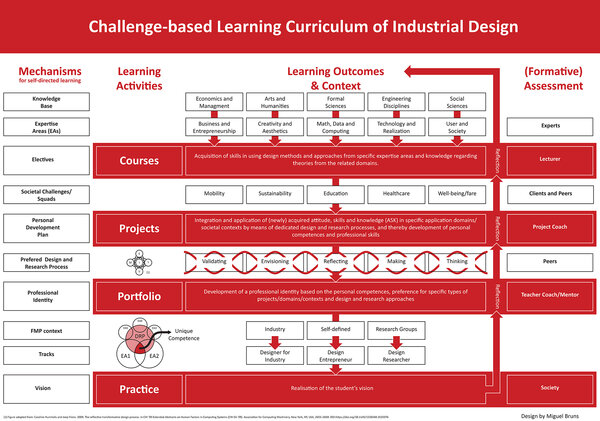Learning at Industrial Design
We aim to offer you a thorough preparation for a rapidly transforming society, emergent technologies, and the challenging role of designers in bridging society and technology through design.
The educational programs of Industrial Design at Eindhoven University of Technology have always distinguished themselves by their focus on designing with the latest technologies, a focus on interactive and intelligent systems, products and related services, and by their emphasis on self-directed and competence-centred learning. We educate you to become designers for the future, capable of solving problems, creating opportunities and generating knowledge.
At Industrial Design, learning is considered a layered process. Learning outcomes should be related to, and integrated in the deep levels of a students’ professional identity and vision. This will ensure learning results are sustainable and choices for courses and projects coherent with personal ambitions. They contribute to each student’s unique profile, providing students with the opportunity to define their personal areas of interest and expertise in their professional career.
On a design level; learning to design requires learning through doing, learning through making and realizing and by reflecting on actions, outcomes and experiences. It requires the will to be actively involved in the experience, the ability to reflect and connect the knowledge and skills to previous experiences and previously gained knowledge and to use it to improve future performances. Experiential learning requires self-initiative and an intention to learn.
This educational approach results in unique, driven designers, entrepreneurs and researchers. Our alumni stand out because of their pro-active, hands-on attitude, where prototyping is an essential part of the design and research process.
Our department uses an adapted competency model (see figure) based on the Criteria for Academic Bachelor and Master Curricula, as defined by Meijers et al. (2005).
**MSc expert in three: DRP and two areas of expertise
Reference: Meijers, A.W.M., van Overveld, C.W.A.M., Perrenet, J.C., Borghuis V.A.J. & Mutsaers E.J.P.J. (2005). Criteria for academic bachelor’s and master’s curricula. TU Eindhoven, The Netherlands.
